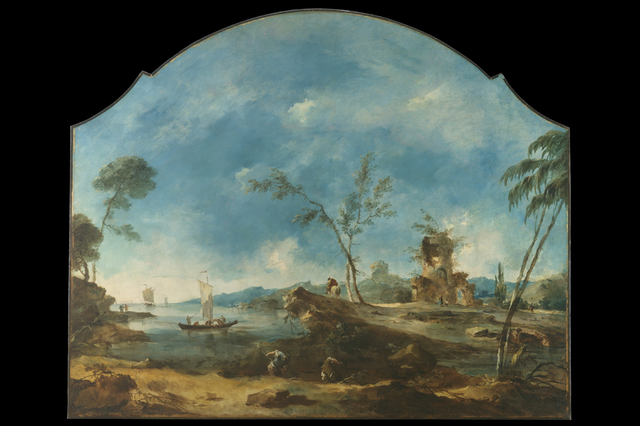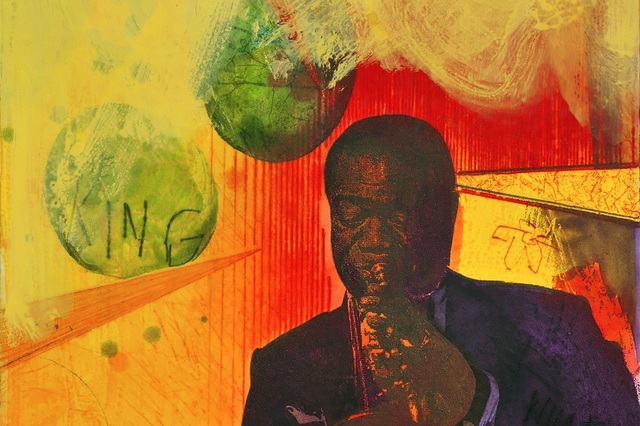We all want to be seen and understood for who we really are. Until, of course, that wish comes true.

I can’t exactly say why, in my third year of college, I signed up for a creative writing class. I didn’t plan to be a writer, and as things turned out, my career hasn’t remotely taken that path. But I was simply following my usual pattern of course selection. The class fit into an opening in my schedule and when I checked it out on the first day, a girl in a Patagonia fleece sat in the front row, blonde ponytail bobbing earnestly as the instructor explained his intention to get us to be honest in our art. I found it appealing that she found honesty appealing. She was also quite pretty in a scrubbed, sturdy, vegetarian sort of way. So I locked the class into my schedule. After the first session, the blonde girl never showed up again.
But I started to enjoy the class. It had only six people in it and I liked the discussions about the other students’ work. We basically had the entire semester to produce one or two or three short stories, and it was obvious we were going to get a good grade just for trying since the professor believed he could perform no better function than to be encouraging. I was working on a story which I represented as based on the romantic surfing life of my high school days in Southern California. It was not particularly honest—I had surfed some, but never enough to get good at the sport, and I certainly never lived a surfing life—but I felt the subject matter gave me a certain Kerouackian cachet with the other members of the class.
The most arresting writing, at least in the view of my classmates, was from a thin, soft-spoken girl with sad deep brown eyes named Teresa. In her story—and, as it turned out, in subsequent stories—the girl protagonist was a slight, sensitive young woman whose boyfriend called her “Dark Eyes.”
I thought it sounded affected. “Come close to me, Dark Eyes.” “Your voice is like the wind off the ocean, Dark Eyes.” Who talks like that?
And all her stories had essentially the same cheerless theme. The lyrical young man would physically and emotionally abuse the delicate and long-suffering yet loyal Dark Eyes.
The class met twice a week, Tuesdays and Fridays, at three in the afternoon, and in a typical session one or two of the class members would read their work and receive feedback from the others. It was spring term, and as winter gave way to milder weather, parkas and raincoats came off. Some students wore shorts and short-sleeved shirts, and it was in the sixth week of the class when, as Teresa recited one of her gloomy narratives of domestic angst, we all noticed the bruises on her arms. A week later she came to class with a pronounced cut on her right cheek.
Three of us—Natalie Frey, the drama major from Teaneck, New Jersey; Clinton Kho, the champion ping-pong player from Orange County, California; and I—had coffee after class and wondered where our responsibilities might lie.
“It’s obvious she’s being abused,” Natalie said with absolute conviction.
“Do we even know she has a boyfriend?” I asked.
“On Fridays she gets picked up by a guy in a blue Volvo,” Clinton said. “The car is waiting for her when we come out of class, in the alley behind Stoner Hall.”
“Same car, same guy?”
“The three or four times I’ve seen it,” Clinton said.
“We can’t just act like nothing’s going on,” Natalie said heatedly. “What if writing what she writes and reading it to us in class is the only way she can cry out for help?”
“Shouldn’t Professor Gray do something?” I asked.
Nobody knew how the teacher intervening in some fashion would work or if he was required to get involved according to some rule. Natalie had the strongest feelings. In the end she found what I thought was a workable solution, coming up with a clever way to broach the topic in class. She wrote a passage into her own short story, the next one she wrote, about workers at a factory who suspect that one of their colleagues is abusing her child. Should they say something?
The other class members were engaged by the dilemma, and the discussion was one of our most lively. Teresa remained noticeably silent. After a couple of people had weighed in on which way they thought things ought to go in the story, Natalie turned to Teresa.
“What do you think?” she asked. “It’s like you writing about Big Sam abusing Dark Eyes, and then you come into class with bruises on your arm, a cut on your face.”
Natalie’s forwardness actually startled me, so I could only imagine the effect on Teresa, whose alert brown eyes opened wide. She turned even more pale than usual, and her breathing became short and audible. But then she was shaking her head.
“What I put in my stories is fiction,” she said.
“We all know about autobiographical fiction,” Natalie told her. “It’s what most of us write when we’re starting out.”
“But I made that stuff up.”
“And the bruises?” Clinton Kho asked, in a tone more gentle and sympathetic than Natalie’s. “The cut?”
“Gardening.”
The class absorbed this answer. After a moment Dr. Gray, who had stayed on the sidelines of the discussion up to this point, asked, “Gardening?”
“I live in the guesthouse of a woman in the hills, and she gives me a break on the rent if I do some of the weeding and flower-trimming and other yard work. It’s all kind of overgrown. A branch snapped back and hit me in the face”—she indicated her cheek—“and I tripped over a stone border.” She hugged her arms. We all looked at her and she shrugged.
I tried to catch Natalie’s eye. I couldn’t tell if she accepted this response. But after class she told Clinton and me that she hadn’t bought Teresa’s answer for a second.
“It’s classic abused-woman syndrome,” she said with some authority and asked Clinton to show us where the guy picked Teresa up. Clinton led us along a path of olive trees that ended at an alley with a loading dock for Stoner, the building that housed many of the biology labs. We all saw Teresa slide into the passenger side of a faded blue Volvo, saying nothing to the rugged guy behind the wheel, who then drove off without any apparent greeting.
The driver of the Volvo looked vaguely familiar, and a few days later I realized why. He worked in a hardware store I occasionally frequented when I needed small fix-up items for my room. He was behind the counter when I went in to buy an extension cord.
He wore a tag on his chest with the name MIKE. Mike was helpful, though not especially friendly. Of course, my sense of his personality could have been colored by Teresa’s depiction of Big Sam. Mike was tall and sturdily built, easygoing by comparison to the tightly wired Teresa.
“If you buy two, you save a dollar,” Mike said distractedly. “Of course, if you don’t need two, then you’re just spending more money in the store.”
I bought one. As he rang up the sale, I told him I needed the extension with its three-outlet end because I had pulled a muscle in my back dragging a heavy bureau away from the wall to get to the outlet and I didn’t want to keep having to move the furniture. He nodded sympathetically while, for me, there were more substantive unspoken topics hovering in the air. But if there were some apt words I was supposed to say, I didn’t know what they were. Should I hand him a twenty-dollar bill and say, “By the way, don’t beat your girlfriend”?
“Have I seen you around campus?” I asked. It was a safe bet that most of the young people who worked in local shops were students earning extra money.
“Dropped out,” he said neutrally.
This might mean he had flunked out for academic or other reasons, or just that he was taking time off. Was there a hint of bitterness? If so, I couldn’t detect it. He might have been a little cold—or perhaps just not terribly interested in working in a hardware store.
He decided to give me the one extension cord for the sale price, and I didn’t know if he was using discretion that was legitimately his as a salesperson, helping out a student on a budget, or sticking it to the man, the owner of the store. There was no way to tell.
“Thanks,” I told him as I pocketed the change.
I hooked up with Teresa about two weeks later.
I was in Gabe’s Books, the used bookstore, on a Saturday night when a soft voice which I immediately recognized spoke behind me.
“Thanks for not piling on,” she said.
I turned toward Teresa, who had collected several books in a store basket. I must have looked confused.
“When everyone in class was giving me the third degree,” she explained. “You didn’t jump in.”
“I had the same questions though,” I admitted.
She glanced at me quickly, a little surprised, a little sad. Those deep brown eyes were gemlike when they had a bit of light in them, and sweetly pretty.
We went to The Cellar for a beer.
“Being honest in fiction doesn’t mean writing a memoir or writing history,” she said. “Fiction is inventing the truth.”
“ ‘Inventing the truth.’ I like that,” I told her, and I did. But it still sounded as though she was trying to convince me, and the class through me, and maybe even herself, that there was nothing untoward in her relationship. I couldn’t help noticing a new bruise on her pallid, otherwise flawless neck.
“You weren’t the surfer dude you’d like everyone to believe.” She smiled. “But it doesn’t make any difference.”
I had to give her points for seeing through me, as she had, with those engaging eyes. “How did you—?”
“I’m pretty good at reading people,” she said. “Plus, I get that a good writer writes what makes a good story.”
I had to add insight to the list of her assets.
Her guesthouse in the hills was a rare find as student accommodations go. It was a tiny, wood-paneled bungalow with a slight whiff of moldiness. But Teresa—or Teresa and Mike—had turned it into a comfortable, clean little nest, and when you opened the shutters on the windows there was even a view. It sat in the owner’s garden which, in that season at least, was crowded with a profusion of blooming bulbs, shrubs and vines.
We were there when Mike was at the store. Teresa made tea which we drank sitting on a mattress on the wooden floor that was both sofa and bed. There was a woven rag rug next to the mattress and a low coffee table piled with books and binders and Teresa’s schoolwork.
I forget whose idea it was for Teresa to give me a massage to help the pain in my back, but it turned out to be something she did expertly and intuitively. Lying facedown on the mattress, eyes closed, I was aware of her solid form and her firm thighs as she straddled my butt in order to knead my back with the full weight of her upper body.
I turned beneath her and she exhaled a soft moan. We both gave in happily, wholeheartedly, to the moment. Any reservations I might have had about Teresa being involved with someone else were conveniently assuaged by my disdain for the way he apparently treated her. How she viewed what we were doing I had no way of knowing. Perhaps I was the beginning of her way out—or just a way of getting back at an oppressor. Or perhaps we had all misread her relationship with Mike.
We spent several powerfully intimate afternoons together in the little guesthouse during the remaining weeks of the term, always when Mike was accounted for on a shift at the hardware store. After the last time, in early May, I fell into a deep sleep. I awakened to find myself alone on the mattress. I heard vigorous sounds from outside the little structure, pounding and grunting. When I went to the window and opened the shutters, I saw Teresa in shorts and a man’s shirt, the tails tied around her midriff, whacking energetically at weeds in the garden. Her hoe split a stone, and a chip hit her on the arm. As she moved through the overgrown yard with a manic intensity, a stiff and thorny vine extending from an arbor came loose and whipped across her forehead, leaving a slender cut.
I wanted to tell Natalie and Clinton what I had seen, but I was less sure about sharing a full explanation of how I came to witness her yard work.
As it happened, the opportunity never arose. At our last class Teresa read her latest and final story. Although the others were relieved that it marked a slight change of pace, it was still another brooding relationship piece. It centered around a young, fair-skinned heroine married to an electrician, who in this story is decent and hardworking, somewhat humorless but in no way abusive. Instead the sensitive heroine falls victim to the wiles of a manipulative seducer she meets in a bookstore. He is a bit of a phony, inventing a reckless adolescence in a motorcycle gang, and he tricks her into an adultery she would otherwise have had no intention of pursuing.
As we walked out of the building for the last time that semester, Clinton was relieved that Teresa’s work truly appeared to have been fictionalized. Natalie was shaking her head.
“I still think she writes what’s close to her in her life,” she said. “And let’s face it, folks. The girl can write.”
“Definitely,” Clinton agreed.
“This new character she introduced . . . ,” Natalie mused thoughtfully. “He was very well-drawn, very real. I almost feel like I know the guy.”
“Maybe you do,” Clinton said. “This is a small community. If she based him on somebody around here, you could know him.”
“I really feel that she did.”
“Who is it then?”
“Give me time,” Natalie said. “It’ll come to me. Coffee, you guys?”
I declined to join them. They went off in one direction, and I went in the other. And since I wasn’t in her program, it wasn’t hard for me to keep a certain distance from Natalie after that day.
Copyright © 2018 by Seth Freeman.



